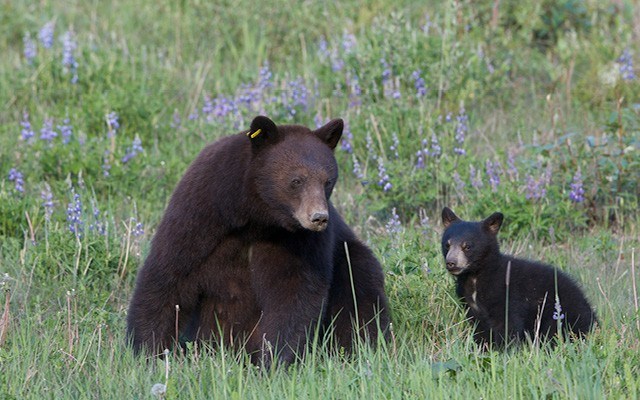The foundation of the Get Bear Smart Society's messaging to the public has always been to "not feed the bears." But in the midst of one of Whistler's worst natural food crises for bruins in years, the non-profit's executive director is wondering if a rare exception should be considered.
"We're in the middle of a massive natural food failure and the bears are coming into town looking for food because they're hungry," said Bear Smart's Sylvia Dolson, referring to a severe shortage of alpine berries that has forced dozens of bears into the valley in recent weeks as they look to fatten up before winter. "In my view, this is when a diversionary feeding program would be the most humane thing to do."
The only problem, of course, is that feeding bears is considered illegal in British Columbia and could net you a hefty fine. That doesn't mean similar programs haven't been used elsewhere before, however.
Parks Canada has effectively diverted black and grizzly bears from tourists for years by planting animal carcasses on ridgetops for them to feed on in peace as they emerge from their dens in the spring.
In 2007, Lake Tahoe-based BEAR League organized an illegal food drop for starving bears after natural food sources were ravaged by drought and wildfire.
"It had a huge impact," explained BEAR League director Ann Bryant. "We were having a horrible, horrible season; we had two forest fires and an awful drought and bears were breaking into houses. They were going into houses even with people in there."
The situation had become so dire that some residents even resorted to shooting at troublesome bears, resulting in the death of one sow. A photo in a local newspaper at the time showed an abandoned house boarded up, with a sign on the window reading, "We give up. The bears win."
Bryant stressed that her organization took every step possible to deal with the crisis, approaching local wildlife officials on numerous occasions with the idea of a diversionary food program, before being flatly denied.
But Bryant and other volunteers weren't deterred, running the program for two months, with hundreds of volunteers climbing into the alpine each night with bags crammed full of orchard fruit — and it worked.
"In the areas where we did the food drops, the break-ins immediately went on the decline and pretty soon stopped," Bryant said. "In the areas we weren't comfortable doing (the drops) because of the threat of arrest, the break-ins escalated."
Bryant, who co-authored a report on the program that will be published next month, said the season following the drop was one of the slowest in recent memory, with conflicts down considerably. Even still, she reiterated that it's a tactic that should be used in only "the most dire emergencies."
In the wake of two bear deaths in Whistler last week, questions have emerged over whether staffing levels at the Conservation Officer Service (COS) may have contributed.
One of the bears killed was a two-year-old, untagged female that was spotted in a tree before making its way into the village. The responding RCMP officer, with no tranquilizing equipment on-hand, made the call to shoot the bear after concluding there wasn't enough time for conservation officers to arrive from Squamish, according to Sgt. Rob Knapton.
Conservation officer Simon Gravel, however, doesn't believe current staffing levels at the COS — which currently has three officers covering the areas of Whistler, Pemberton, Squamish, North Vancouver, Lions Bay and Bowen Island — contributed.
"I don't think low staffing was a factor," said Gravel, adding that additional officers will often be brought in from other areas to assist when needed. "We did have some COs who were well aware of the situation and we were monitoring it closely.
"We have to deal with what we have in terms of staff," he added. "You can be certain that our officers are working hard and working lots of extra hours."




